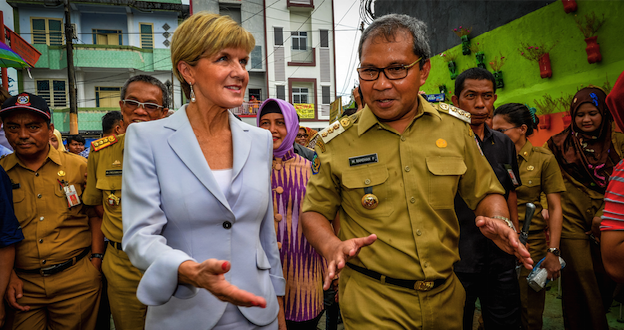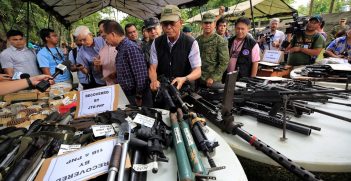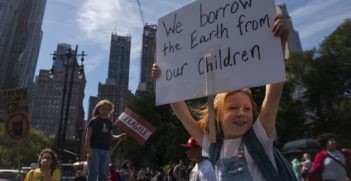A Roadmap for Australian Security Policy

Our leaders should try to do what they believe to be worth doing for the country. When John F. Kennedy said during his inauguration “Ask not what your country can do for you, but what you can do for your country” he was indicating what most countries wishing to advance should be doing.
The evolution of a new order is now an important issue facing all countries. The belief that the spread of democracy and free markets would automatically create a just, peaceful and inclusive world is fading away.
After the Second World War the United States wanted to implement ideals and practices it believed should be applied throughout the world. The spread of democracy was the overarching goal. Now however, the United States, fatigued by unsuccessful wars in Iraq and Afghanistan, now faces the rise of States with greater economic growth rates and rapidly expanding middle classes, such as China, India and Indonesia in our own region, and a more assertive Russia which regards itself as both a Pacific and an Atlantic power, as well as countries such as Brazil and Mexico in South America.
The time period from 1948 to 2000 will probably be seen as a brief period of history when global order was based on US idealism (sometimes overlooked, for example in the cases of Nicaragua, Grenada, Chile and Vietnam) and traditional concepts of the balance of power.
The US wanted to expand a co-operative international order of countries following common rules that included liberal economic systems, respect for national sovereignty, and the general adoption of democratic systems of governance.
The evolution of a new order is now a major international issue facing all countries. The belief that the spread of democracy and free markets would automatically create a just, peaceful and inclusive world is, however, fading away.
The so-called Western “rules” of the international system are no longer accepted by rising major countries such as China, India and Indonesia as the basis of world order. United States’ leaders – with the exception of Donald Trump, for all the wrong reasons – seem reluctant to accommodate the major changes in power now underway.
Henry Kissinger wrote in his recent book World Order that “a reconstitution of the international system is the ultimate challenge to statesmanship in our time”. He also argued that “the domination of a region by one country militarily … could produce a crisis in the rest of the world”. Clearly Dr Kissinger was thinking of the possible roles of the United States, China and India and possibly Indonesia in relation to ASEAN and Russia.
The goal for leaders in our region – Asia and the South West Pacific – must be to build a regional community that will reflect the changed world ahead.
ISIS and the Middle East
It logically follows that the need to focus on our own region means we should withdraw our forces from Iraq and Syria. Our presence in the Middle East will not contribute in any meaningful way to defeating ISIS or securing stable, democratic, corruption free governments in Iraq and Afghanistan. Our involvement was in support of the US alliance, although US policies appear now to be failing. The reality is that our participation is unnecessary, peripheral and symbolic.
Indeed Australia should move out of this very complex, fluid kaleidoscope of warring Sunni, Shite and Kurd religious factions and all the involved countries, including Saudi Arabia, Iran, Yemen, Iraq, Turkey, Syria, the US, the UK and France. We should not pretend to ourselves that we can really influence an outcome, which is likely to be years away.
By the same logic Australia should remove our remaining troops from Afghanistan. While there were reasons for joining the US led invasion in 2002, now, fourteen yeas later, there have been 41 Australians killed, over $550 billion spent and more than 13,000 Afghan civilians killed. Moreover objectives once deemed to be indispensable such as nation building and effective counter insurgency have been downgraded or abandoned because there are no longer adequate resources, time, or a publicly supported US will to achieve them.
I consider Australia should also in future avoid suggesting that ISIS is a state. It is not a state. It has no air force or navy and even the territory it controls in Iraq and Syria is relatively limited. Recent events suggest that Iraq is on the verge of becoming a failed state. There is a tendency here both to exaggerate the effectiveness of Western-trained Iraqi forces and to assume all terrorist activities are being conducted by ISIS. In fact Al Qaida, the Kurds, Boko Haram in West Africa and other groups have been responsible for a number of recent terrorist activities. In fact, Western intervention in the Middle East has led to an increase in terrorism, not a lessening of it, meaning that ISIS probably welcomes Western intervention.
Regional disputes
Australia should not take sides on Chinese, Japanese, Vietnamese, Malaysian or Philippine disputes within ASEAN on rival territorial claims as the US has done. Australia’s focus should be on the unimpeded passage to the mainland of China through waters in the South China Sea, as the United States insists on in respect of access to its ports.
In conclusion, Australia needs to adopt a more clear, Asia-focused security policy. If it does, it will be a more secure, prosperous, more influential and outward-looking modern nation, more welcomed in our region of the world and internationally.
Richard Woolcott AC is a Fellow of the AIIA and former diplomat. He has served as Australian Ambassador to Indonesia and the United Nations and is the former secretary of the Department of Foreign Affairs and Trade. This article is part two of a series published on recommendations for Australian foreign policy after the election. It is published under a Creative Commons Licence and may be republished with attribution.




